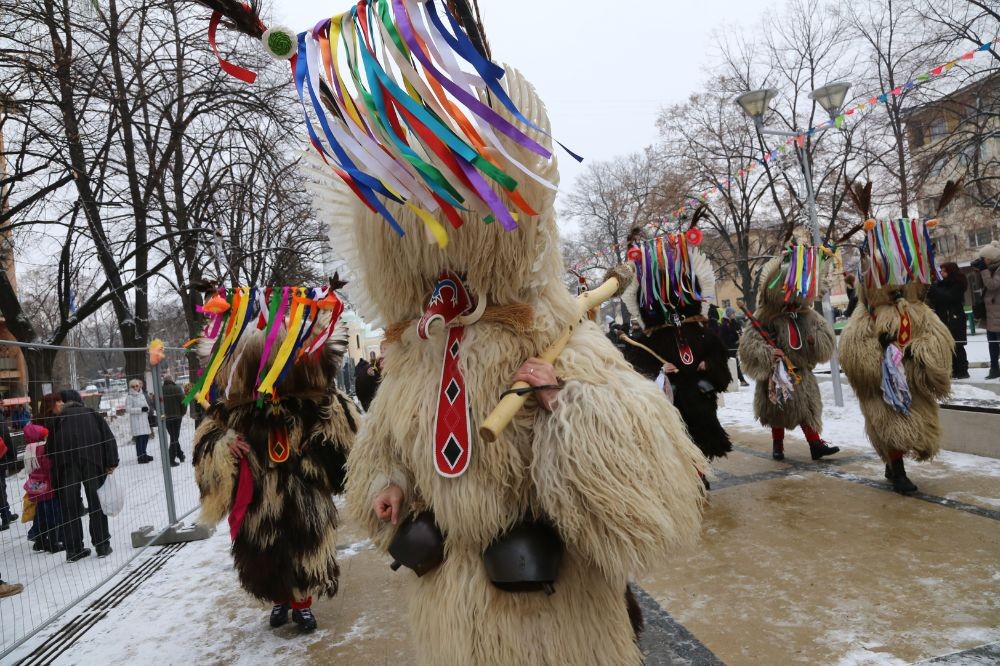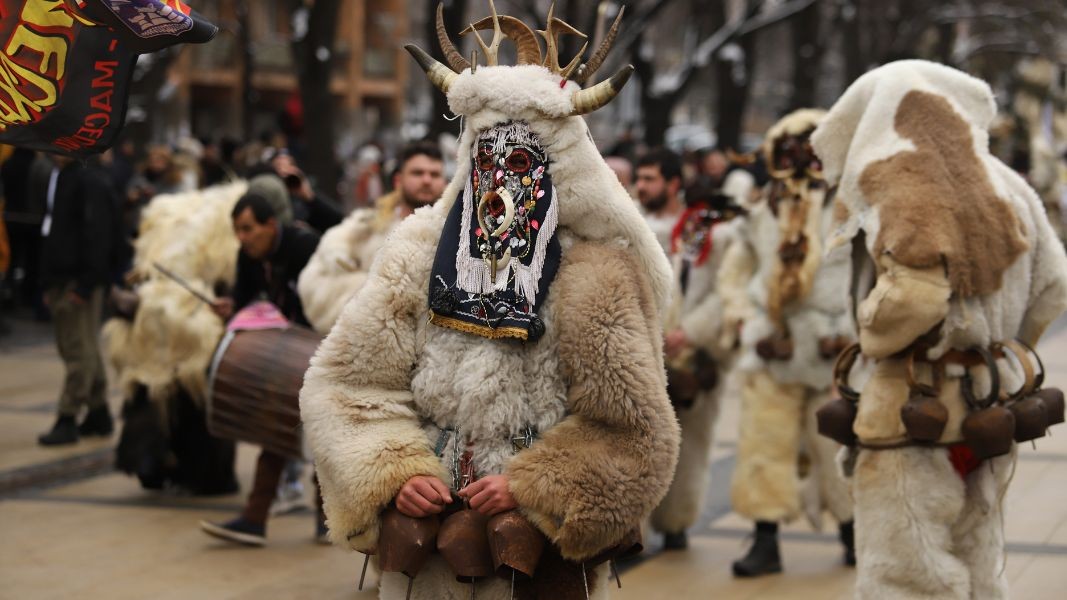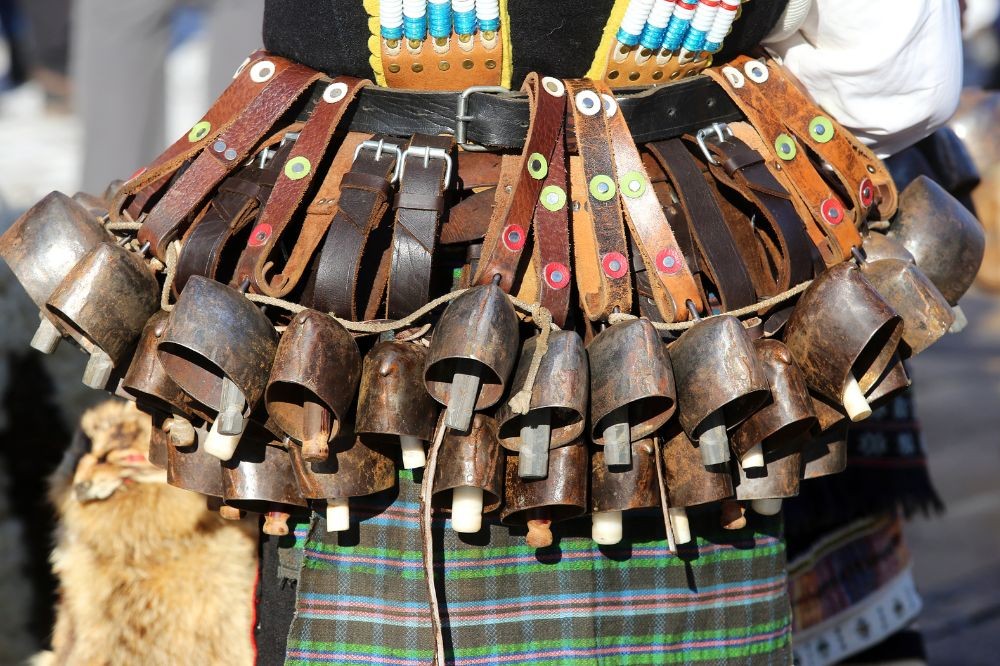The countdown is on, in the town of Pernik near Sofia, to the most colourful, noisiest and biggest masquerade festival in Bulgaria. They call it Surva, as this old tradition in the towns and villages of Western Bulgaria is called. It is a men-only event, with the participants, wearing spectacular masks and costumes with hundreds of bells, making a noise as they pass through the streets of the town.
In the region of Pernik, the participants in these carnival processions are called survakari, hence the name of the local tradition – Surva. The people taking part in the pre-spring masquerade games in other parts of Bulgaria are known as kukeri. The symbolism of the festival aims to drive away evil forces and to make preparation for the coming awakening of spring. The masquerade games are accompanied by well-wishing – for a bountiful harvest, for health and prosperity.
The ancient pagan tradition of masquerade games is very popular with the youngest generation – proof of which is their interest in the annual festival in Pernik. With the passing of the years it has grown to be an event of national significance, with people from all parts of the country thronging to the town during Surva. In the space of just three days, in 2023, Pernik was visited by over 50,000 fans of the winter masquerade tradition.
This year, the town is getting ready to welcome more than 10,000 survakari for the 30th edition of the festival in the days from January 26 to 28. The event will be even bigger and more lavish, the organizers from Pernik municipality say. All kinds of folklore characters from all over the country have been invited to join in the grand festival parade Surva 2024 – kukeri, babugeri, jamalari.
“It is the biggest masquerade festival in Europe, and it will bring together participants from Bulgaria as well as 18 groups from other countries who will also join the parades. That is the reason why the masquerade processions start on Friday, 26 January with a youth masquerade parade called Survakariade,” says, in an interview with Radio Bulgaria, Adrian Skrimov, PR expert with the municipality:
“This year’s parade will include 1,100 children from all schools in Pernik. It will start at 10 AM on 26 January. The masquerade parades in Pernik will continue on Saturday and on Sunday – starting at 10 AM and continuing until the late afternoon – we want each one of the participants to demonstrate the masquerade tradition of the place they come from. We have groups from all ethnographic regions of Bulgaria coming, as well as participants from other countries, the biggest groups being from the Balkan countries. People just love the Kurent from Ptuj in Slovenia, who will be here once again. There will also be guests from Portugal, Italy and Spain.”
At Surva time the town is always full of people and noise, even the pandemic did not stop the tradition – even through the big festival in Pernik itself was cancelled for three years in a row, there was some kind of festival in each of the many villages in the area.
“If we go to any village around Pernik, we shall see many children taking part in the groups of survakari. They wear folk costumes or have donned carnival masks,” Adrian Skrimov says and goes on:
“This goes to show that the tradition is alive, that it is evolving. People in the town say that Pernik is the heart of Surva and that Surva is the heart of Pernik. And not just the festival but also the events taking place every year on 13 and 14 January in every small village which bring in throngs of people – locals as well as visitors. In one of the biggest folklore groups from Yardjilovtsi village, people like to say that there may be nothing happening in the village but that there will always be Surva. During the year, all participants take care of their costumes, add more bells or make new masks.In 1966, 700-800 people from the region of Pernik took part in the first national edition of the kukeri and survakari festival; in 1985 from national, the festival turned international, and 10 years later Pernik became a member of the Federation of European Carnival Cities. On 26 June, 2009, the town was declared European capital of masquerade and mummer games. That is why now, 15 years later we are doing our best to advance the festival, to invite more and more people to come in contact with tradition, because here everything is authentic and genuine.”

Photos: BGNES
A Christmas tree with Bulgarian decorations has been placed in a central location at the Griffin Museum of Science and Industry in Chicago. For the fifth consecutive year, Bulgarians living in Chicago crafted the lavish decoration of the Bulgarian..
The usurpation of cultural heritage is one of the many inevitable consequences of any military conflict, both historically and today. Until the end of the war in Ukraine, it is impossible to adequately analyse the extent of the damage caused to the..
Athens plans to modernise the Greek army by 2030 Greece's Defence Minister Nikos Dendias presented the plan for changes in the army to the parties in parliament. The reforms will cover all three branches of the military. By 2030, 33 units..
The traditional Bulgarian Christmas picnic, organized by the Bulgarian Cultural and Social Association "Rodina - Sydney" and the Bulgarian School..

+359 2 9336 661
